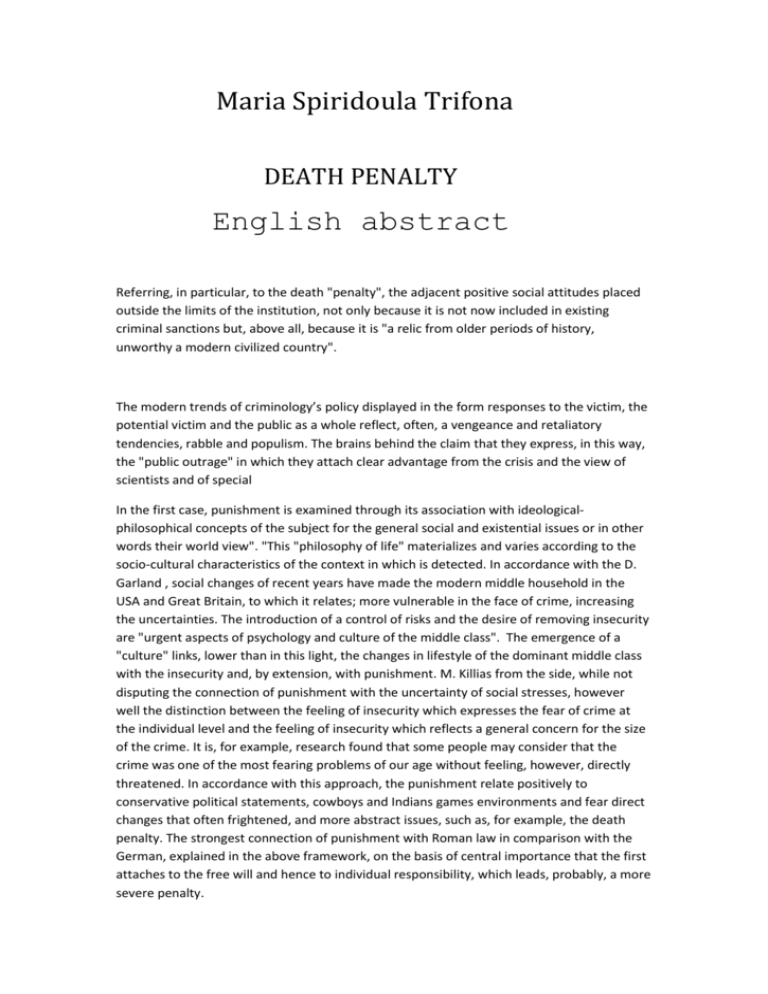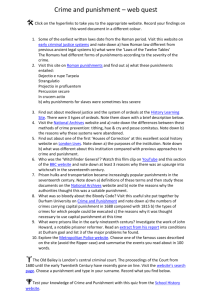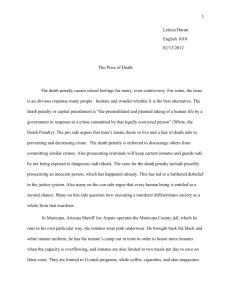Triphona Maria Spiridoula
advertisement

Maria Spiridoula Trifona DEATH PENALTY English abstract Referring, in particular, to the death "penalty", the adjacent positive social attitudes placed outside the limits of the institution, not only because it is not now included in existing criminal sanctions but, above all, because it is "a relic from older periods of history, unworthy a modern civilized country". The modern trends of criminology’s policy displayed in the form responses to the victim, the potential victim and the public as a whole reflect, often, a vengeance and retaliatory tendencies, rabble and populism. The brains behind the claim that they express, in this way, the "public outrage" in which they attach clear advantage from the crisis and the view of scientists and of special In the first case, punishment is examined through its association with ideologicalphilosophical concepts of the subject for the general social and existential issues or in other words their world view". "This "philosophy of life" materializes and varies according to the socio-cultural characteristics of the context in which is detected. In accordance with the D. Garland , social changes of recent years have made the modern middle household in the USA and Great Britain, to which it relates; more vulnerable in the face of crime, increasing the uncertainties. The introduction of a control of risks and the desire of removing insecurity are "urgent aspects of psychology and culture of the middle class". The emergence of a "culture" links, lower than in this light, the changes in lifestyle of the dominant middle class with the insecurity and, by extension, with punishment. M. Killias from the side, while not disputing the connection of punishment with the uncertainty of social stresses, however well the distinction between the feeling of insecurity which expresses the fear of crime at the individual level and the feeling of insecurity which reflects a general concern for the size of the crime. It is, for example, research found that some people may consider that the crime was one of the most fearing problems of our age without feeling, however, directly threatened. In accordance with this approach, the punishment relate positively to conservative political statements, cowboys and Indians games environments and fear direct changes that often frightened, and more abstract issues, such as, for example, the death penalty. The strongest connection of punishment with Roman law in comparison with the German, explained in the above framework, on the basis of central importance that the first attaches to the free will and hence to individual responsibility, which leads, probably, a more severe penalty. In the second case, however, the factors involved are very specific issues everyday crime, which shall be treated as direct threats from and causing them fear and insecurity. In this light, the role of philosophy is not important and the attitudes and perceptions about the refinements of criminal penalties associated with the pre-existing experience and the recruitment of risking. The role of the media is, in any event, very important. It is a fact that the empirical investigation of τιμωρητικών attitudes provides a multilateral framework knowledge on the complex scientific issue confirming, in parallel, the need for modular use quantitative and qualitative methods of analysis. In particular, the results of the Greek research allow the demarcation of the knowledge field and the development of international scientific experience for the more comprehensive investigation and in our country. The greatest difficulty, which faces a similar research project is the diversity of factors which contribute to shaping punishment stops and can only be dealt with through the multidisciplinarity of approaches. From the research findings based on the one hand, the dimensions of punishment attitudes and on the other hand, the different sides depending on the meaning. The image that is formed on this basis does not allow simplifications of social attitudes but requires, however, the balanced approach of the recognition of the role of social problems, the operation of the official social control of crime as well as the important role of education and information on cool and rational approach to the total criminal phenomenon. In conclusion, could be summed up that the dimensions of the punishment lie partly with the crime problems and partly to the ethics/ideological framework of the underlying. In the first case, the aim is to minimize or annihilation of the likelihood that secondary victimization and, therefore, the punishment linked with insecurity and the search for institutional but effective "answers" to the problems of daily life. The prison as the most widely used but as a heavier than the current penalties, occupies the first position the requirements of "punish mental" citizens. In the second case, it focuses on the rebuilding of the affected forms of civil society from the crime and the punishment associated, therefore, with the rampage return of evil caused by the offender. In this case, uncertainty is not a good way of explanation , giving this role in world view.









